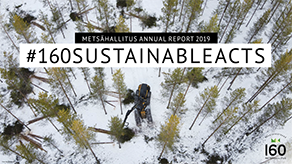Metsähallitus. Annual Report and Financial Statement 2019
Metsähallitus celebrated its 160th anniversary in 2019 and promoted good operating methods, climate action s and non-discrimination.
Metsähallitus Group’s revenue in 2019 was EUR 368.5 million and the result was EUR 129.2 million. Metsähallitus will pay the Finnish State EUR 138.9 million in the public interest from its 2019 profits.
Metsähallitus was one of the first government agencies in Finland to publish a Code of Conduct and we also renewed the Equality and Non-Discrimination Plan. Both of these actions promote social responsibility in Metsähallitus’ operations and services in a broad-based manner.
Due to the market situation, the year was varied in terms of forestry. The positive trend in wind power and rock material activities continued even though a cautious market reflected on the agreements made with companies.
Metsähallitus launched a climate programme with the objective of helping to mitigate climate change and prepare for the changing conditions created by climate change both in nature and the economic and social operating environment. Metsähallitus’ investment of EUR 77.6 million from business operations in biodiversity, recreational use, Sámi culture and reindeer husbandry was higher than ever before. Active ecological management measures targeted the most endangered habitats and species.
The popularity of recreational use of nature and wilderness experiences increased in 2019. A total of 8.2 million visits were made to national parks, state-owned hiking areas and other public sites managed by Metsähallitus. People spent 1.9 million days in state-owned wilderness areas, with those who purchased a wilderness permit accounting for more than 480,000 days. The number of visits and wilderness days also reflected on the local economy: the impact of national park visitor spending was EUR 219.3 million and EUR 46.7 for wilderness visitors.
The GRI standard has been used as the reference framework for the report and it mainly meets the requirements of the GRI core option. With the exception of the financial statements data, the responsibility reporting information has not been confirmed by an external party.
